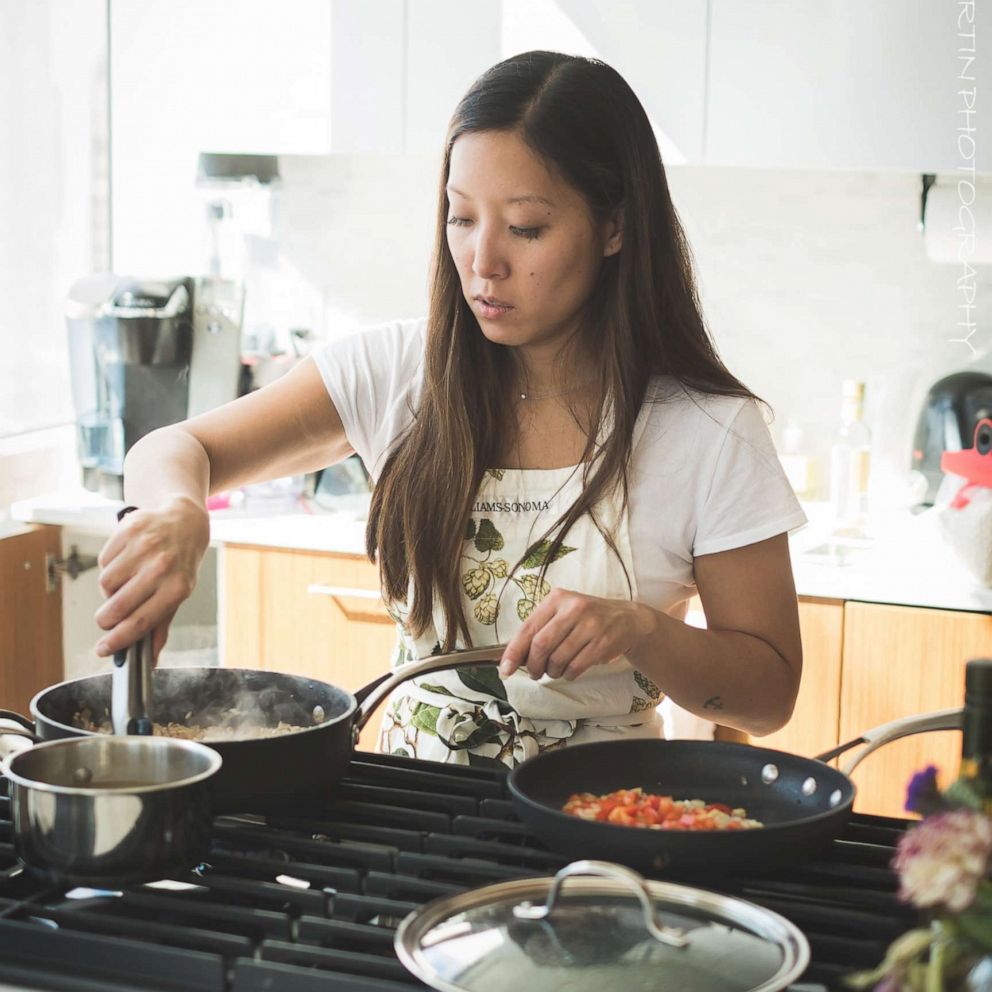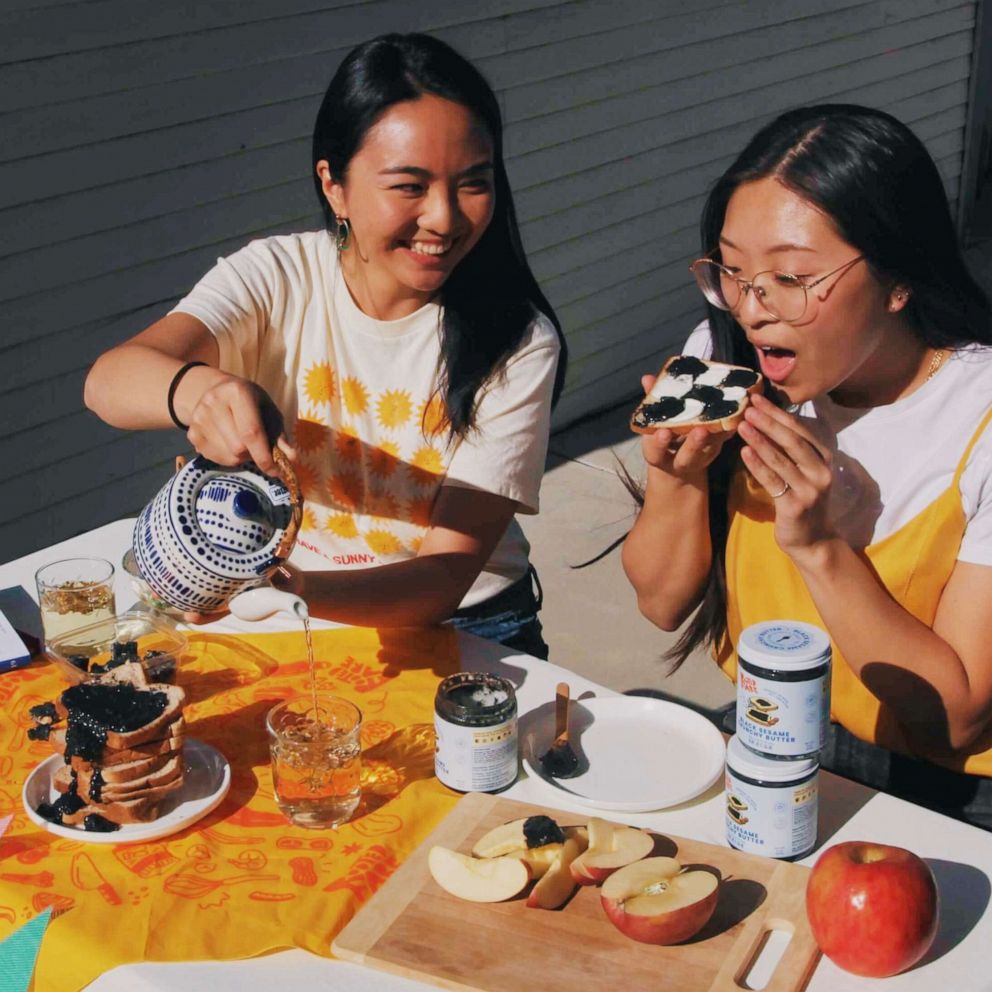Korean food creator celebrates mom's recipes after experiencing lunch shaming as a kid
Sarah Ahn revealed to her mom she was bullied at school for eating kimbap.
Sarah Ahn still remembers being mocked for eating Korean foods like kimbap as a child at a predominantly white school. But as an adult, she has harnessed the power of social media to celebrate her culture's cuisine, elevating her mom's recipes into mainstream America's feeds.
"Kids asked me why I brought that to school and [said] it looks disgusting," Ahn recalled, telling "Good Morning America" about the dried seaweed and rice dish she was excited to eat and proud to bring in third grade. "This was something that a lot of students had never seen. And when I opened my lunch pail and revealed the kimbap, everyone was shocked."
That moment became a catalyst for a culinary course correction at home.
"I went home and told my mom to never make me the kimbap again and to just pack me a sandwich instead," Ahn said. "I never told her the kids thought it was disgusting -- for two reasons -- I didn't want to embarrass her, but I also had this immature resentment and just told her to pack the sandwich instead."

Today, the 28-year-old Southern California-based social media coordinator has made a career out of sharing culinary moments, but it's her original food content and storytelling as Ahnestkitchen (pronounced "honest kitchen") that has captivated millions on TikTok and Instagram.
When Ahn shared that same school lunch story in a voiceover video while her mom, 65, made a roast beef sandwich, it reached viral fame, sparking discussions in the comments and garnering 2.5 million views.
"It wasn't until I made that reel that I revealed it to my mom that that happened at school, and she was so heartbroken," Ahn shared. "She's not used to that type of bullying because she grew up in Korea where it's a very homogenous country and everyone's Korean, so she would have never expected that people would shame a food that she grew up with."
Ahn explained to her mom, who shed tears upon hearing this story decades later, that the problem is especially pervasive for other immigrant children.
"I've heard other stories where other kids will just stick up for themselves -- I love hearing that narrative too," she added.
Korean cuisine surges in popularity
From Korean ingredients getting fused with American dishes like the viral kimchi grilled cheese, which took over TikTok, to Trader Joe's selling out almost instantly after it launched a frozen kimbap last fall, the rise of Korean cuisine has been all the rage among Americans.
"I started to appreciate my mom's food more, so when Korean culture became very popular in the United States, once I saw that Korean culture was just growing everywhere and people were loving it, I started to appreciate the depth of Korean culture that I live in," Ahn said.
It's not just food either. Interest and excitement for all things Korean culture -- K-pop, K-drama and K-movies -- has "normalized the things that we were once bullied for," Ahn said.

Everyone's journey with food and heritage is personal and inimitable, and Ahn believes, at least in diverse areas like New York and California where she splits her time, that many children seem to have a safe space now to enjoy a meal that is uniquely theirs.
"Some of my friends, now that I'm older, they have kids and they will always ask their parents to bring something from their culture to school, because they're now considered the cool kid," Ahn shared. "That is just so amazing because it's changed so much. And I'm so proud that, you know, things are changing like that."
Part of that change stems from creators like Ahn, who share their family's recipes and stories on the internet for others to enjoy and learn more about.
While it can appear "very easy to make," Ahn assured that "there's so much labor of love that's hidden between those easy steps," which is why it's important for her content with her mom to include "those little extra steps that will really show people the beauty of Korean cuisine."
"The second purpose of Ahnest Kitchen is that I want to show the not-so-glamorous life and the hard working life my parents live, to make sure that their kids are OK," she explained. "My dad paints for a living and my mom owned a restaurant where she was the cook, the cashier, and everything -- I just want to show that side of of our family that just you don't see often on social media."
While it's expected for kids to learn and ask questions at school, especially outside the classroom at lunchtime, Ahn encouraged parents to create a space for conversations about different cultures at home.
"I would want those kids to know that there's diversity -- not just as humans in our skin color, [but] with how we eat our foods and what we consume every day, and to be open to trying new foods before making certain remarks," she said. "That really starts with having conversations at home about what diversity is."







